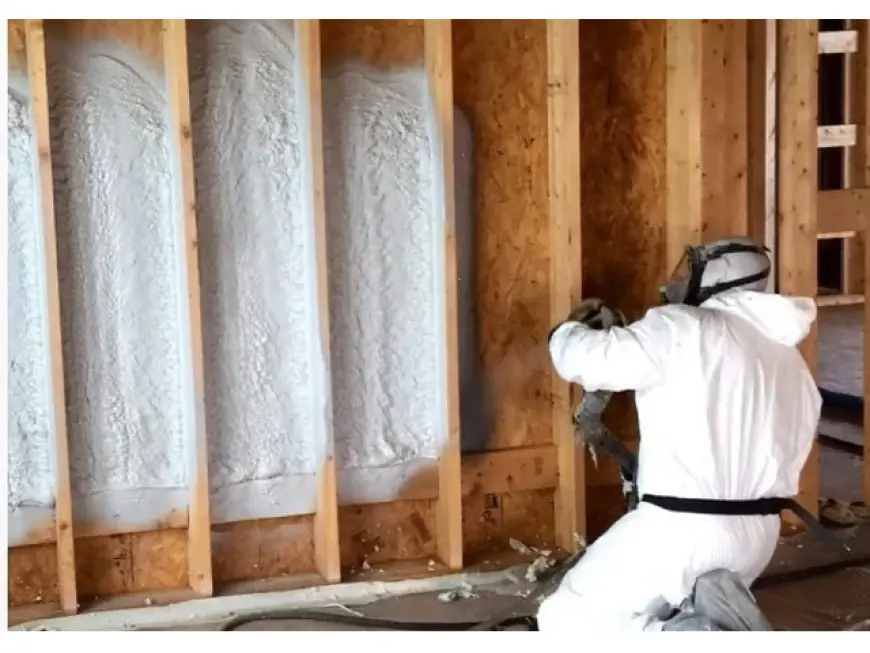How Roofing Insulation Creates a Quieter Home Environment

Imagine trying to enjoy a Saturday morning coffee while the neighbor’s leaf blower screams in your ear. Or maybe a sudden thunderstorm pounds your roof so hard that you can’t hear yourself think. Noise from outside can wreck the peace of a home, leaving residents frustrated and distracted. A solution exists that’s often overlooked: roofing insulation. It’s not just about keeping your home warm; it’s about crafting a sanctuary from sound.
For homeowners and commercial property owners, spray foam roofing contractor offers a simple yet highly effective method to reduce unwanted noise. Whether it’s traffic, construction, or weather disturbances, adding insulation to the roof can drastically reduce sound penetration, creating a calmer, more comfortable environment.
How Roofing Insulation Absorbs and Blocks Noise
The main function of roofing insulation in noise reduction is its ability to absorb sound vibrations and block them from entering living spaces. Insulation materials act like a sponge for sound waves, reducing the intensity of noise that reaches the interior of a building.
Types of Insulation Materials
Different roofing insulation materials vary in their soundproofing performance. Common options include:
-
Spray Foam Insulation: Expands to fill gaps, sealing cracks that allow sound through.
-
Fiberglass Batts: Dense layers trap sound waves effectively.
-
Mineral Wool: Excellent for both thermal and acoustic insulation, particularly in high-traffic urban areas.
Fun Fact: Mineral wool insulation was originally developed from volcanic rock, giving it both fire resistance and noise-dampening properties.
How Material Density Impacts Noise Reduction
Denser materials tend to block more noise because they resist vibrations better. Light, fluffy insulation may trap heat but often leaves more sound passing through. Homeowners can weigh thermal efficiency against acoustic benefits to select the best fit.
The Role of Roof Design in Acoustic Performance
Insulation is only part of the equation. Roof design influences how much noise enters a home. Certain architectural choices enhance the soundproofing effect of insulation.
Pitch and Layers
Steeper roof pitches can deflect rain and hail, reducing impact noise inside. Multiple layers of roofing materials combined with insulation provide an additional barrier for sound waves.
Ventilation Considerations
Proper ventilation ensures air circulation without compromising noise reduction. Air gaps can reduce thermal efficiency if not combined with dense insulation, but they can also create space for additional sound-dampening layers
Fun Fact: Even a single inch of spray foam insulation can reduce up to 50% of external noise in an average home setup.
Comparing Roofing Insulation Types for Noise Control
Choosing the right insulation depends on the balance between thermal performance, cost-effectiveness, and acoustic benefits. Below is a quick comparison of popular roofing insulation types for noise reduction:
This table can help homeowners and commercial property owners make informed decisions based on priorities for soundproofing versus energy efficiency.
Benefits Beyond Noise Reduction
While quieter rooms are the main draw, roofing insulation offers additional advantages. Understanding these benefits helps property owners see the full picture.
Thermal Comfort and Energy Savings
Insulation helps maintain consistent indoor temperatures. Less noise penetration often comes with improved energy efficiency, as denser materials trap heat and reduce drafts.
Increased Property Value
Homes and commercial properties with effective noise control systems are more attractive to buyers or tenants. Quiet living and working spaces are a premium feature, especially in busy urban areas.
Fun Fact: Noise complaints can actually decrease property values, so reducing sound can be seen as an indirect financial investment.
Protection Against Weather Damage
Insulation adds a buffer layer that can protect the roof deck from moisture, hail, and extreme temperatures. While its main role in this article is noise reduction, the protective aspect contributes to long-term durability.
Common Misconceptions About Noise Reduction
Many assume that adding insulation will completely soundproof a home, but it’s important to set realistic expectations. Insulation reduces noise—it doesn’t eliminate it entirely. External noise is always partially transmitted through windows, walls, and structural vibrations. Combining insulation with other noise reduction methods, such as acoustic panels or double-glazed windows, can further improve results.
Location Matters
Homes near highways or railroads may require denser, multilayer insulation systems for noticeable improvement. In quieter neighborhoods, standard roofing insulation may already provide substantial noise reduction.
Installation Quality Impacts Effectiveness
Even the best insulation loses its effectiveness if gaps remain or layers are uneven. Precision in installation ensures maximum performance.
Conclusion
Roofing insulation offers a practical, multi-functional solution for creating quieter home and commercial environments. By absorbing and blocking sound waves, dense insulation materials significantly reduce external noise, improving comfort, focus, and overall quality of life. Choosing the right material, considering roof design, and paying attention to installation details are all crucial for achieving optimal results.
Beyond noise control, roofing insulation enhances thermal efficiency, protects the structure from weather damage, and can even increase property value. It is a worthwhile investment for any homeowner or commercial property owner looking to elevate their living or working conditions with minimal effort.
By understanding the science behind acoustic performance and making informed material choices, reliable spray foam insulation contractor can help property owners enjoy a more serene environment without expensive renovations or major structural changes.
FAQs
How does spray foam roofing insulation reduce noise?
Spray foam expands to fill gaps and cracks in the roof structure, which prevents sound from traveling through small openings. It also has dense material properties that absorb vibrations, reducing external noise inside the building.
Can fiberglass insulation improve acoustic performance in the roof?
Yes, fiberglass batts trap sound waves within their dense fibers, lowering noise transmission. However, gaps or compression during installation can reduce their effectiveness, so careful placement is key.
Does roofing insulation eliminate all external noise?
No, insulation significantly reduces noise but doesn’t completely block it. Noise from windows, doors, or structural vibrations still penetrates, so combining insulation with other noise reduction methods can enhance results.
Is mineral wool the best option for urban homes?
Mineral wool offers high-density sound absorption and fire resistance, making it particularly effective in noisy urban environments. Its durability also adds value for long-term installations.
How does insulation affect indoor temperature while reducing noise?
Insulation acts as a thermal barrier, keeping indoor temperatures stable. Denser insulation materials that reduce noise also improve energy efficiency, lowering heating and cooling demands.
Reviewer: Olivia Thompson has spent 10 years working in spray foam insulation, helping companies grow their visibility. She reviewed this article and provided valuable suggestions on how to better align the content with the needs and expectations of customers, ensuring it resonates with the target audience.
What's Your Reaction?
 Like
0
Like
0
 Dislike
0
Dislike
0
 Love
0
Love
0
 Funny
0
Funny
0
 Angry
0
Angry
0
 Sad
0
Sad
0
 Wow
0
Wow
0

















































